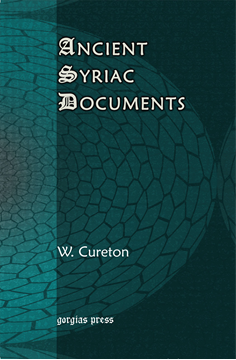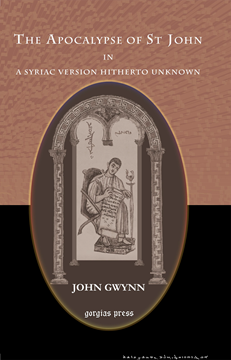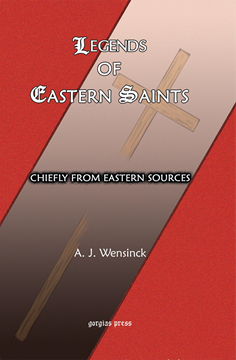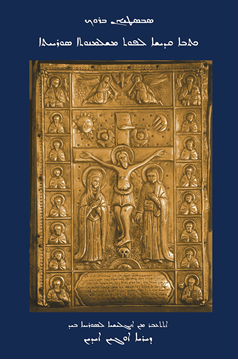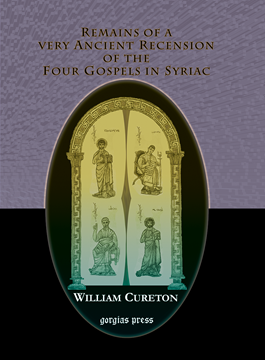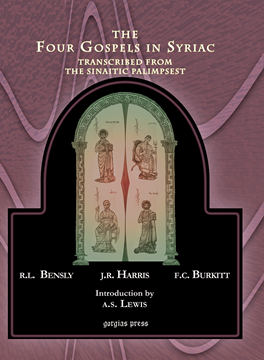Ancient Syriac Documents
ISBN: 1-59333-136-3
Cureton’s book was first begun as early as 1848 on the basis of manuscripts in the collection of the British Museum. It furnished nineteenth-century students of Syriac Christianity with a wealth of new resources and continues to be just as valuable for students today.
$165.00 (USD)
The Ancient Fathers on the Priesthood
On the Office and Work of the Priesthood in the Church of Christ
By Edward Male
ISBN: 1-59333-043-X
This book draws upon the works of numerous patristic authorities as well as Bernard of Clairvaux and Peter de Blois. Male synthesized their theological reflection and endeavored to present “the unanimous sentiments of the Church Catholic on its important subject.”
$76.00 (USD)
Remnants of the Later Syriac Versions of the Bible
By John Gwynn
ISBN: 1-59333-175-4
In this two-part work, originally published in 1909, John Gwynn presented a small collection of New and Old Testament Syriac biblical texts, drawn from the Philoxenian and Syro-Hexaplar versions. Both parts are composed of Syriac and Greek texts and accompanied by Gwynn’s extensive notes.
$169.00 (USD)
The Gospel of the Twelve Apostles With the Apocalypses of Each One of Them
Together with the Apocalypses of Each one of Them, ed. from the Syriac MS.
ISBN: 1-59333-008-1
Harris edits and translates into English an eighth-century Syriac version of the Gospel of the Twelve Apostles that belongs to a well-defined apocalyptic tradition.
$64.00 (USD)
The Apocalypse of St. John
In a Syriac Version Hitherto Unknown
By John Gwynn
ISBN: 1-59333-174-6
Published in 1897, John Gwynn’s, The Apocalypse of St. John in a Syriac Version Hitherto Unknown, was the first Syriac book issued from the Dublin University Press. It is based on his study of a manuscript obtained on loan from the personal library of the Earl of Crawford.
$160.00 (USD)
Dr. Grant and the Mountain Nestorians
ISBN: 1-59333-181-9
Drawing extensively from Dr. Grant's own letters and journals, Laurie's narrative provides a lively account of the life and work of a little-known nineteenth-century missionary.
$187.00 (USD)
Legends of Eastern Saints
Chiefly from Eastern Sources
ISBN: 1-59333-243-2
In this GP edition, scholars and students will find Wensinck’s collection of texts from Ethiopic, Arabic, Syriac, and Karshuni manuscripts, as well as English translations of the legends of Archelides and Hilaria, assembled in one volume.
$179.00 (USD)
The Bible in the Syriac Tradition (Syriac Version)
Translated from English into Syriac by Eugene Aydin
ISBN: 1-931956-15-4
This is an introduction, written in Syriac, to the Syriac versions of the Bible, with chapters on the manuscript tradition, the main editions, commentaries, and various aspects of the ways the Bible was interpreted and used in the Syriac literary and liturgical tradition. Originally written for a Syriac Studies course at the St Ephrem Ecumenical Research Institute (SEERI), in Kottayam, India, this new edition has been brought up to date and the bibliography expanded.
$70.00 (USD)
Remains of a Very Ancient Recension of the Four Gospels in Syriac
ISBN: 1-59333-245-9
Working from a composite manuscript obtained in 1842 from the Syrian monastery of St. Mary Deipara, Cureton reconstructed the fragmentary remnants of what he identified as a fifth-century manuscript of the four canonical Gospels.
$115.00 (USD)
The Four Gospels in Syriac, Transcribed from the Sinaitic Palimpsest
Transcribed by Robert Bensly, J. Rendel Harris, and F.C. Burkitt
ISBN: 1-59333-185-1
On Mount Sinai, Agnes Smith Lewis discovered the palimpsest manuscript that would be known as the Sinai Codex. The discovery was shared with Robert L. Bensly and F. Crawford Burkitt. The three of them worked on the manuscript, this work presenting the fruit of their labors.
$150.00 (USD)
